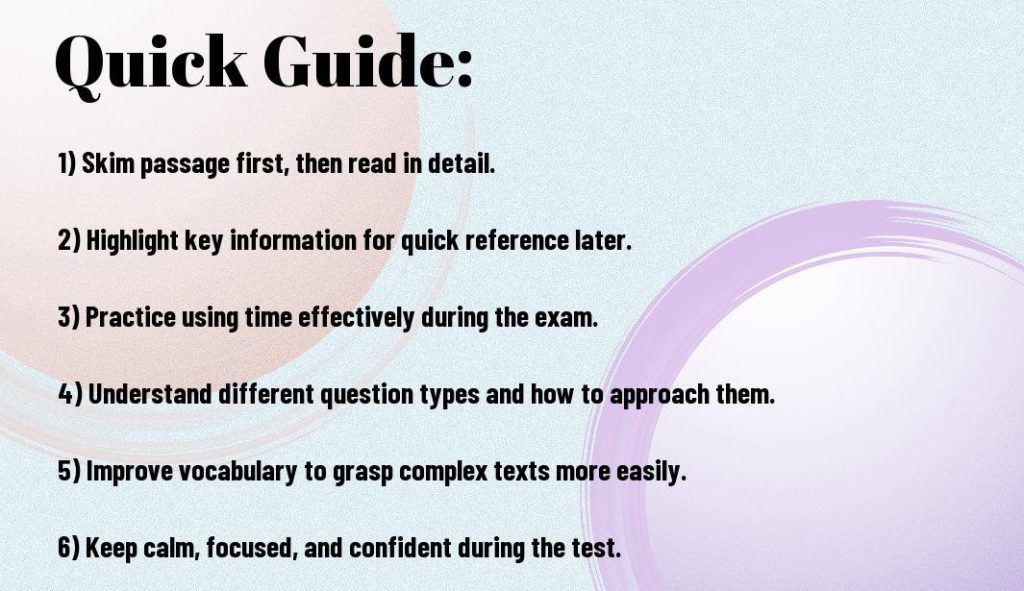Table of Contents
You may also interested:
TL;DR: Essential Tips to Excel in IELTS Reading
- Skim and scan: Use skimming to get the main idea of the text and scanning to quickly locate specific information.
- Underline keywords: Highlighting key words in the questions and the passage helps in finding answers more efficiently.
- Practice time management: Allocate different time slots for each section and stick to them to complete the test on time.
- Guess intelligently: If unsure about an answer, make an educated guess by eliminating obviously wrong options.
- Improving vocabulary: Enhancing your vocabulary through reading different genres can help in understanding complex passages.
Most test-takers find the IELTS Reading section to be challenging, but with the right strategies and preparation, you can ace it effortlessly. In this comprehensive guide, we will share the top 10 tips to help you enhance your reading skills, improve your comprehension, and ultimately score higher on the IELTS exam. Whether you are a beginner or looking to refine your approach, these expert tips will boost your confidence and performance in the reading section.

Types of IELTS Reading Tasks
You can enhance your IELTS Reading skills by understanding the different types of tasks you may encounter in the exam. Knowing these variations will help you approach each task more effectively. To research deeper into this topic, check out 10 IELTS Reading tips for band 9.
Identifying the Different Question Types
- Multiple Choice
- True/False/Not Given
- Matching Information
- Matching Headings
- Summary Completion
Some test-takers find it beneficial to familiarize themselves with the distinct question types before attempting the IELTS Reading tasks. Perceiving the nuances in each type can lead to better results on the exam.
Strategies for Tackling Each Type
- Skim the Text
- Underline Keywords
- Read Carefully
- Eliminate Wrong Answers
- Practice Regularly
IELTS candidates can employ specific strategies tailored to each question type to optimize their performance on the reading section. Types of tasks can vary in complexity, requiring different approaches for accurate and efficient responses.Step-by-Step Tips for Reading Mastery Many students struggle with the Reading section of the IELTS exam, but with the right strategies, you can improve your scores significantly. Follow these step-by-step tips to master IELTS Reading:
- Understand the question types and reading skills required.
- Practice skimming and scanning techniques.
- Build your vocabulary and improve comprehension.
- Focus on improving your reading speed and accuracy.
- Learn how to manage your time effectively during the exam.
- Practice with past exam papers to familiarize yourself with the format.
- Work on identifying keywords and key information in the passages.
- Use elimination strategies to narrow down answer choices.
- Read actively and engage with the text to better understand the content.
- Seek feedback from teachers or tutors to identify areas for improvement.
Any of these strategies can help you boost your performance in the IELTS Reading section and achieve your desired band score.
Skimming and Scanning Techniques
Little time? Master skimming for main ideas and scanning for specific details. Skim the passage quickly to get the gist of the content, then scan for keywords that match the questions to find the relevant information efficiently.
Vocabulary Building and Comprehension
An extensive vocabulary is crucial for understanding complex passages. Plus, understanding the context in which words are used can aid in comprehension. The more words you know, the easier it will be to grasp the meaning of the text.

Key Factors Affecting Reading Performance
Once again, understanding the key factors that affect your reading performance is crucial when preparing for the IELTS Reading section. Factors such as vocabulary knowledge, reading speed, and concentration play a significant role in how well you perform on the exam. By identifying these factors, you can focus your efforts on improving in these areas and ultimately boost your overall reading score.
- Vocabulary knowledge
- Reading speed
- Concentration
- Understanding different question types
Thou must carefully consider these factors and work on strengthening them to enhance your reading performance on the IELTS exam.
Time Management During the Exam
While taking the IELTS Reading exam, effective time management is key to success. Allocate specific time limits for each passage to ensure you have enough time to read and answer all questions. Aim to answer easier questions first and come back to the more challenging ones if time allows. Bear in mind, pacing yourself is necessary to complete the exam within the allotted time frame.
Dealing with Difficult Passages
Even the most proficient readers may encounter challenging passages during the IELTS Reading exam. In such cases, focus on extracting key information and main ideas from the text rather than getting bogged down by complex details. Utilize skimming and scanning techniques to grasp the gist of the passage quickly, and refer back to the text when answering questions to ensure accuracy.
Factors to consider when dealing with difficult passages include the complexity of the language used, unfamiliar topics, and the structure of the text. By breaking down the passage into smaller, more manageable parts, you can improve your comprehension and tackle difficult passages more effectively.
Pros and Cons of Various Preparation Methods
| Preparation Method | Pros and Cons |
|---|---|
| Self-Study | Flexibility, cost-effective, personalized pace. Lack of accountability, limited access to feedback. |
| Classroom Learning | Structured approach, social interaction, immediate feedback. Fixed schedule, higher cost, less flexibility. |
| Utilizing Online Resources | Convenience, vast resources, interactive tools. Lack of personalized guidance, potential for distractions. |
Self-Study vs. Classroom Learning
Clearly, self-study allows for flexibility and personalized learning experiences, whereas classroom learning offers structured guidance and immediate feedback. It ultimately depends on your preferred learning style and level of self-discipline.
Utilizing Online Resources
Consistently utilizing online resources offers convenience and a wide range of study materials. However, it may lack the personalized guidance provided in a traditional classroom setting. It is crucial to stay focused and avoid distractions while using online resources for IELTS preparation.
Final Words
Conclusively, mastering the IELTS Reading section requires strategy, practice, and focus. By following the top 10 tips outlined in this guide, test-takers can improve their comprehension, time management, and overall performance. Remember to stay calm, manage your time wisely, practice regularly, and familiarize yourself with the different question types. With dedication and perseverance, success in the IELTS Reading section is within reach.
FAQ
Q: What is IELTS Reading?
A: IELTS Reading is a test component designed to evaluate your reading skills for academic and general purposes.
Q: Why is IELTS Reading important?
A: IELTS Reading score plays a crucial role in determining your overall IELTS band score and can impact your academic or career goals.
Q: How can I improve my IELTS Reading score?
A: You can improve your IELTS Reading score by practicing regularly, enhancing your vocabulary, and developing skimming and scanning techniques.
Q: What are some common challenges in IELTS Reading?
A: Common challenges in IELTS Reading include time management, unfamiliar vocabulary, and difficulty in understanding complex passages.
Q: What are the top 10 tips for mastering IELTS Reading?
A: The top 10 tips for mastering IELTS Reading include understanding the test format, practicing with sample papers, improving reading speed, and using effective note-taking strategies.





